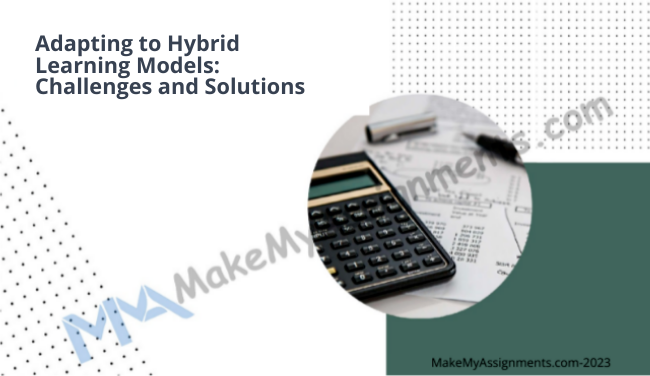
Adapting to Hybrid Learning Models: Challenges and Solutions
In recent years, the education landscape has undergone a transformative shift with the integration of hybrid learning models. Blending traditional classroom instruction with online learning, hybrid models offer a flexible and personalized approach to education. However, this transition is not without its challenges. In this blog, we will explore the hurdles faced in adopting hybrid learning models and propose innovative solutions to address them.

Challenges
- Technological Infrastructure: One of the primary challenges in implementing hybrid learning is ensuring schools have the necessary technological infrastructure. Disparities in access to devices and reliable internet connectivity among students can hinder the effectiveness of online components.
Solution: Schools must invest in equitable access to technology, providing devices and ensuring internet connectivity for all students. Collaboration with local governments and private entities can help bridge these gaps.
- Teacher Training and Preparedness: Many educators may not be well-versed in the nuances of online teaching methods. Transitioning from traditional to hybrid models requires training teachers to effectively use digital tools and create engaging online content.
Solution: Institutes should invest in professional development programs to equip teachers with the skills needed for hybrid teaching. Workshops, webinars, and mentorship programs can facilitate the transition.
- Student Engagement and Motivation: Keeping students engaged in a hybrid learning environment can be challenging. Distractions at home, lack of face-to-face interaction, and a sense of isolation can negatively impact student motivation.
Solution: Implement interactive and collaborative online platforms. Encourage peer-to-peer interaction, group projects, and virtual discussions. Regular feedback and communication between teachers and students can also foster a sense of connection.
- Assessment and Evaluation: Traditional assessment methods may not seamlessly translate into the online space. Ensuring fair and effective evaluation of students’ understanding and progress is a key challenge.
Solution: Explore alternative assessment methods such as online quizzes, project-based assessments, and open-book exams. Emphasize the development of critical thinking and problem-solving skills over rote memorization.
- Data Security and Privacy: With the increased reliance on digital platforms, ensuring the security and privacy of student data is a significant concern. Educational institutions must safeguard sensitive information against potential cyber threats.
Solution: Implement robust cybersecurity measures, conduct regular audits, and ensure compliance with data protection regulations. Educate both teachers and students about the importance of online security practices.
Solutions
- Hybrid Learning Best Practices: Develop and disseminate a set of best practices for hybrid learning, including guidelines for effective online teaching, creating engaging digital content, and fostering a collaborative virtual environment.
- Community Engagement: Foster a sense of community by involving parents, caregivers, and the local community in the educational process. Regular communication, parent-teacher conferences, and community events can enhance support for hybrid learning.
- Continuous Feedback and Adaptation: Establish a feedback loop for continuous improvement. Regularly collect feedback from both teachers and students, and use this information to adapt and refine the hybrid learning model.
- Flexibility in Curriculum Design: Develop a flexible curriculum that allows for a seamless transition between in-person and online learning. Design courses that leverage the strengths of both modalities, providing a dynamic and adaptable learning experience.
- Collaboration with EdTech Providers: Forge partnerships with educational technology providers to access cutting-edge tools and resources. Collaborate with these providers to customize solutions that meet the specific needs of the institution and its students.
As students and educational institutions grapple with the challenges of adapting to hybrid learning models, the role of academic support services becomes increasingly crucial. MakeMyAssignments, a leading online assignment help platform, stands as a valuable ally in navigating the complexities of this new educational landscape. In this section, we will explore how MakeMyAssignments can aid students in overcoming the challenges associated with hybrid learning.
- Expert Guidance in Digital Learning Tools: MakeMyAssignments provides students with access to a pool of experienced tutors well-versed in the utilization of various digital learning tools. From online collaboration platforms to virtual classrooms, these experts can guide students on effective usage, maximizing their learning experience.
- Tailored Tutoring for Hybrid Learning Skills: Recognizing the need for students to adapt to the unique demands of hybrid learning, MakeMyAssignments offers personalized tutoring sessions. Tutors can assist students in developing essential skills such as time management, online communication, and effective use of technology for academic purposes.
- Assistance in Online Assessments: The platform recognizes the shift in assessment methods and offers specialized assistance for online assessments. Whether it’s guidance on navigating virtual exams or help with project-based assessments, MakeMyAssignments supports students in showcasing their understanding and skills in the digital realm.
- Customized Assignment Help: MakeMyAssignments understands the evolving nature of curricula in hybrid learning models. The platform offers customized assignment help services, aligning with the dynamic requirements of courses that seamlessly integrate in-person and online components.
- Feedback and Revision Support: In a hybrid learning environment, constructive feedback is vital for student improvement. MakeMyAssignments provides detailed feedback on assignments, aiding students in understanding their strengths and areas for development. Additionally, the platform offers revision support to help students enhance their understanding of concepts.
- 24/7 Availability and Flexibility: Recognizing the asynchronous nature of hybrid learning, MakeMyAssignments ensures 24/7 availability of its services. This flexibility allows students to seek assistance at their convenience, catering to varied schedules and time zones.
- Data Security and Confidentiality: MakeMyAssignments prioritizes the security and confidentiality of student information. The platform adheres to strict data protection measures, ensuring that students can confidently seek assistance without compromising their privacy.
As the educational landscape evolves, MakeMyAssignments emerges as a valuable partner for students navigating the challenges of hybrid learning. With its commitment to providing expert guidance, tailored support, and a secure learning environment, MakeMyAssignments empowers students to excel in the dynamic and flexible educational models of today. In a world where adaptability is key, MakeMyAssignments stands ready to support students on their academic journey, ensuring they thrive in the hybrid learning era.


